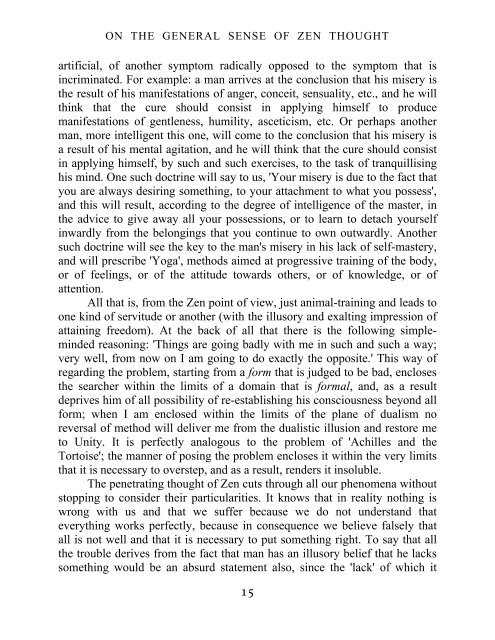The Supreme Doctrine - neo-alchemist
The Supreme Doctrine - neo-alchemist
The Supreme Doctrine - neo-alchemist
Create successful ePaper yourself
Turn your PDF publications into a flip-book with our unique Google optimized e-Paper software.
ON THE GENERAL SENSE OF ZEN THOUGHT<br />
artificial, of another symptom radically opposed to the symptom that is<br />
incriminated. For example: a man arrives at the conclusion that his misery is<br />
the result of his manifestations of anger, conceit, sensuality, etc., and he will<br />
think that the cure should consist in applying himself to produce<br />
manifestations of gentleness, humility, asceticism, etc. Or perhaps another<br />
man, more intelligent this one, will come to the conclusion that his misery is<br />
a result of his mental agitation, and he will think that the cure should consist<br />
in applying himself, by such and such exercises, to the task of tranquillising<br />
his mind. One such doctrine will say to us, 'Your misery is due to the fact that<br />
you are always desiring something, to your attachment to what you possess',<br />
and this will result, according to the degree of intelligence of the master, in<br />
the advice to give away all your possessions, or to learn to detach yourself<br />
inwardly from the belongings that you continue to own outwardly. Another<br />
such doctrine will see the key to the man's misery in his lack of self-mastery,<br />
and will prescribe 'Yoga', methods aimed at progressive training of the body,<br />
or of feelings, or of the attitude towards others, or of knowledge, or of<br />
attention.<br />
All that is, from the Zen point of view, just animal-training and leads to<br />
one kind of servitude or another (with the illusory and exalting impression of<br />
attaining freedom). At the back of all that there is the following simpleminded<br />
reasoning: 'Things are going badly with me in such and such a way;<br />
very well, from now on I am going to do exactly the opposite.' This way of<br />
regarding the problem, starting from a form that is judged to be bad, encloses<br />
the searcher within the limits of a domain that is formal, and, as a result<br />
deprives him of all possibility of re-establishing his consciousness beyond all<br />
form; when I am enclosed within the limits of the plane of dualism no<br />
reversal of method will deliver me from the dualistic illusion and restore me<br />
to Unity. It is perfectly analogous to the problem of 'Achilles and the<br />
Tortoise'; the manner of posing the problem encloses it within the very limits<br />
that it is necessary to overstep, and as a result, renders it insoluble.<br />
<strong>The</strong> penetrating thought of Zen cuts through all our phenomena without<br />
stopping to consider their particularities. It knows that in reality nothing is<br />
wrong with us and that we suffer because we do not understand that<br />
everything works perfectly, because in consequence we believe falsely that<br />
all is not well and that it is necessary to put something right. To say that all<br />
the trouble derives from the fact that man has an illusory belief that he lacks<br />
something would be an absurd statement also, since the 'lack' of which it<br />
15




